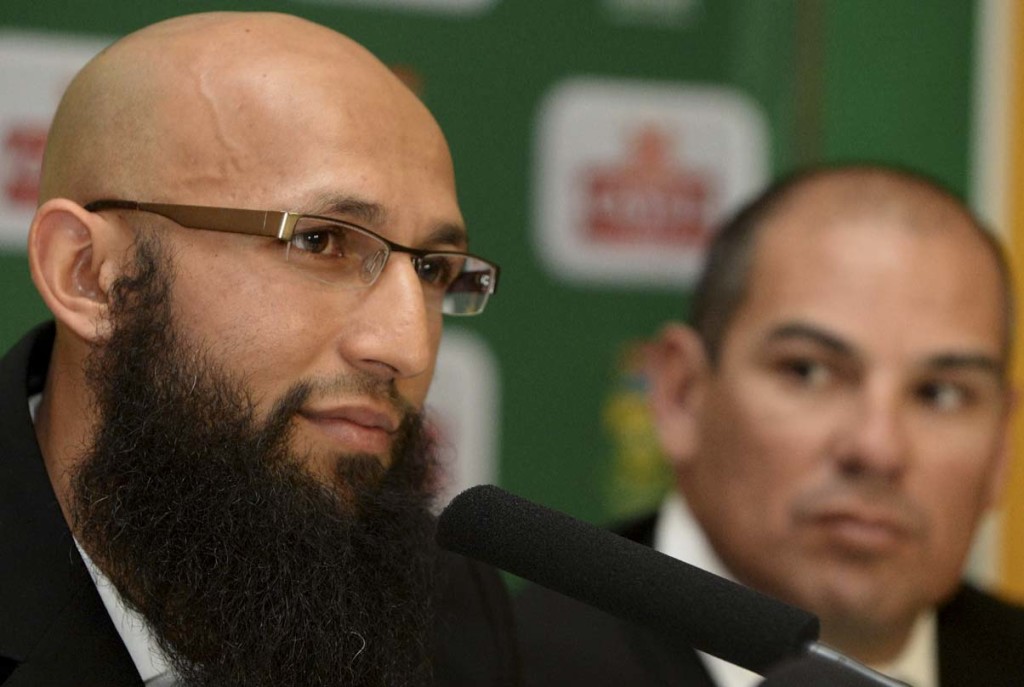Hashim Amla, as the Test captain, should have been appointed the national leader in all three formats.
I could understand Amla’s selection only as Test captain if his batting style was not deemed good enough for ODIs or T20Is.
I don’t like the three-captain philosophy when players like Amla and AB de Villiers are among the rare breed who could challenge for a place in a World XI, regardless of format.
Amla is a popular choice to succeed Graeme Smith. You only have to read the reactionary opinions. I had to have a chuckle, though, at Ali Bacher’s view that the player has no skeletons in his cupboard.
Everyone else focused on Amla’s skill as a cricketer and his potential as a leader. The common word was respect. Bacher mentioned the lack of skeletons as one of the plusses.
Talking of skeletons, Smith didn’t have any either, but the history of rebels tours and Hansie Cronje’s unfortunate association with the illegal betting syndicates of the game meant Smith inherited a squad that initially carried question marks because so many of the personnel played under Cronje.
Smith was a brilliant leader in South African cricket’s most testing period in the post-isolation era. Most, in his absence, will finally appreciate Smith’s influence, effectiveness and value. Smith did it in becoming the most successful captain in the history of Test cricket. He set the standard Amla has to emulate.
Amla is a popular choice because he is also inoffensive and the antithesis of Smith, in persona and approach. Both share a similar passion for cricket and for South Africa.
The challenge for Amla will be the additional responsibility. He has been a very reluctant hero for the Proteas and up until a few months ago he was also a very reluctant captain.
Performing for South Africa and being among the best batsmen in the world seemed to motivate him more than the status attached to captaining South Africa.
Amla, the cricketer, is good enough to succeed. It’s the off-field trappings of leading one’s country that will be his greatest challenge. For one so mindful of being out of the public eye, he will be thrust into it now at every opportunity.
De Villiers and to a lesser degree Faf du Plessis (if he can hold down a regular place in the Test top order) will assist but you have three strong leaders, who at different times get the casting vote in what gets done on the field.
As stated I’ve never been a fan of having three different captains for the sake of it. I know the pro-three lobby will argue that no individual should be handling the captaincy responsibility all year round in all three formats and that this system offers some mental respite.
I am not a believer in that system when the Test captain is good enough to make the ODI and T20I sides. It was a straight choice between Amla and De Villiers, who succeeded Smith as ODI captain.
De Villiers, the world’s premier batsman in all forms, also keeps wicket. That would be an argument not to give him the captaincy. Again, if he was deemed the best among the leaders, relieve him of the keeping duties and give him the captaincy in all three formats.
The Proteas are spoiled to have the options of Amla, De Villiers and Du Plessis. But so much of the Amla appointment is based on possibility and not probability. He was a captain at age-group level but has not led a side consistently for the last decade.
If deemed the right man to take South African cricket into this so-called new era, I’d have like to see him given the role in all three formats. The best cricketers are capable of playing all three. The best captains are equally capable of leading in all three.
For now all are hailing the three-captain split and Amla’s appointment. Once the battle commences the hard questions will be asked of all three. I’d have preferred just the one voice to be answering and have a Proteas national team, in Tests, ODIs and T20Is, shaped around one leader.







